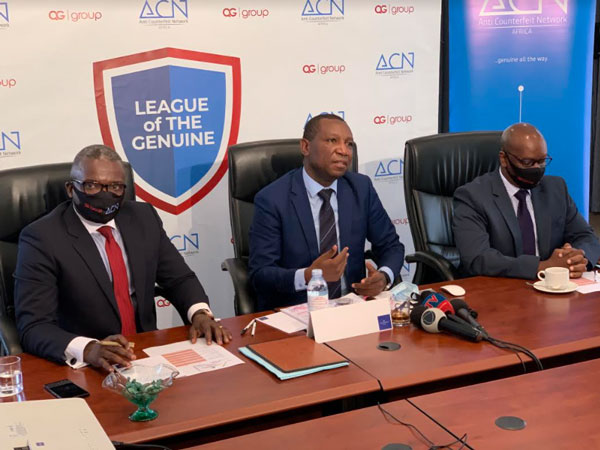
Kampala, Uganda | THE INDEPENDENT | Experts believe that the ongoing impact of COVID-19 on the economy will result in scarcity of legitimate products, which in turn will lead to an increase in proliferation of fake products on the market, as companies cut costs for survival and competitiveness.
The new trend of selling goods via various social media platforms will only serve to make the bad situation worse, anti-counterfeit experts say, as consumers try saving cost by choosing low-cost offers.
With an estimated budget of over Shs 41 trillion and a 54% of either counterfeit or substandard products in the market, it is estimated that Uganda could be losing up to Shs 6 trillion to counterfeits and substandard products every year.
To counter this, the Anti-Counterfeit Network (ACN) in collaboration with QG Group has today launched the “League of the Genuine” (LOG) partnership to champion the awakening of the consumer and decision-makers to the concealed dangers of counterfeits and assist stakeholders to guard against the devastating economic and social effects of fakes.
Under the campaign slogan “Don’t Be Fake, Buy/Sell Genuine”, the LOG partnership shall support partners and stakeholders with creative, administrative, and network resources and developing, executing strategies and interventions to guard against counterfeiting.
Speaking during the signing of an MoU with the QG Group at Protea Hotel, ACN Director legal Fred Muwema said the partnership is a sign of commitment and support, officially solidifying the alliance of the ‘League of the Genuine’, the team protects and benefits traders, consumers, and the economy by combatting fakes and it’s devastating effects.
“With 83.5% of Uganda’s population aged between 15 – 29 years precariously engaged in the low-income informal sector and currently rewarding counterfeit business not only poses a threat to intellectual property, jeopardizes innovation and undermines legitimate business but also causes a high risk to consumer health and safety and destroys genuine business,” Muwema emphasized.
Also noting, factors such as weak regulatory standards and systems, inspection mechanisms, high public moral decadence, and corruption, which — combined with low-income levels — creates a counterfeiting culture and exacerbate loopholes that counterfeiters exploit.
Richard Kawesa, the Director of Strategy at the ACN further noted that the complex dynamics that drive the prevalence of counterfeits in Uganda require collective, coordinated, and sustained interventions and not individual effort.
“That is why,” said Kawesa, ” the LOG partnership encourages the public, brands, organizations, law enforcement agencies, and policymakers to join forces behind the LOG and work closely to expose counterfeit perpetrators, advocate for the dangers of counterfeits or substandard products and develop and implement policies to safeguard genuine products.”
“With our partner, we have developed a multifaceted strategy to address all the driving features of counterfeit culture such as consumer ignorance, inability to distingush between genuine and fake goods, dangers of counterfeiting, psychosocial factors in terms of mindset or behavior, and the lack of adequate cooperation or support from key stakeholders.”
According to David Galukande, the QG Managing Director, the LOG partnership will provide a platform to ensure that the public understands the devastating social, health, and economic impact of counterfeiting because open communication is the best way to combat counterfeit culture.
“We believe in the ACN-QG League of the Genuine (LOG) against fakes partnership and trust that advocating Anti-counterfeiting will benefit the country, attract international investment and interest, encourage local entrepreneurship to be original and build confidence in the value of brands and local markets,” Galukande said.
Galukande contended that combating counterfeiters requires a combined and simultaneous effort from all stakeholders. This he said, can be done by “addressing legislative, regulatory, enforcement, technological, and communication gaps. This calls for the unrelenting commitment of not only the government and its agencies but also industries, manufacturers, citizens, and other stakeholders to join the fight and tackle the problem of counterfeits that – if unsolved – can destroy both lives and businesses.”
 The Independent Uganda: You get the Truth we Pay the Price
The Independent Uganda: You get the Truth we Pay the Price



